By Alyssa Newman, PsyD, Staff Psychologist, Creighton University Student Counseling Services
Our world the last couple of months has been difficult, to say the least—social distancing, cancellations of major events, having to self-quarantine, financial strains etc. We have been forced to live in a constant state of uncertainty and adapt to a “new normal.” With uncertainty and adaptation comes vulnerability. Dr. Brené Brown, research professor and storyteller, defines vulnerability as the feeling we get during times of uncertainty, risk, or emotional exposure.
 While searching for content around vulnerability, I came across an episode from Dr. Brown’s podcast, Unlocking Us that stood out to me. In the episode, she points out how difficult, uncomfortable, and vulnerable we feel when trying something for the first time. She goes on to say that over time, we become so afraid of feeling vulnerable that we stop trying new things, and instead, only stick to what we know. However, when we try new things more often (i.e., allow ourselves to be vulnerable), even though it is uncomfortable, we start to build courage.
While searching for content around vulnerability, I came across an episode from Dr. Brown’s podcast, Unlocking Us that stood out to me. In the episode, she points out how difficult, uncomfortable, and vulnerable we feel when trying something for the first time. She goes on to say that over time, we become so afraid of feeling vulnerable that we stop trying new things, and instead, only stick to what we know. However, when we try new things more often (i.e., allow ourselves to be vulnerable), even though it is uncomfortable, we start to build courage.
We as humans are averse to being placed in vulnerable situations and individuals experiencing eating disorders are no exception. For many, their eating disorder becomes all-consuming and it can be hard to imagine life without it. When the choice is made to step outside of the eating disorder and work towards recovery, vulnerability ensues. This can come in many forms, whether it’s a decision to seek out treatment, try a new food, or refrain from engaging in an eating disorder behavior.
So how do we get through feelings of vulnerability when we are doing something for the first time? Dr. Brown suggests following these three steps:
Normalize. Put a name to the emotion(s) you are experiencing. Know that whatever emotion(s) you are feeling in this moment is valid and worth acknowledging. For example:
- I am scared that I won’t know who I am without my eating disorder.
- I feel anxious when I think about gaining weight.
- I am ashamed that I am still experiencing an eating disorder as an adult.
Put it in perspective. Know that this experience and emotion(s) are temporary. Eventually, you will be able to look back on this moment and feel differently. For example:
- It’s okay that I’m scared now, I won’t be scared forever.
- I’ve been anxious before and made it through, I can do it again.
- This is the first time I’m talking about my eating disorder with someone, of course, I’m feeling ashamed.
Reality-check expectations. Trying something for the first time is harder and takes longer than we think. With that, comes an impact physically, emotionally, psychologically etc.
- I may not know who I am without my eating disorder now, but I am working on it. There will be good, bad, and in-between days.
- I don’t have to like it, but right now, I need to gain weight for my physical health.
- I am asking for help now, I wasn’t in a place to do it sooner.
Reference:
Brown, B. (2020, March 20). Brené on FFTs. Unlocking Us. [Audio podcast]. Retrieved From https://brenebrown.com/unlockingus/
This advice is not to be used in place of a licensed mental health provider, please visit the Nebraska Eating Disorders Network About page for professionals who can help you work through the difficult world of mental health, body image and eating disorder recovery.




Recent Comments